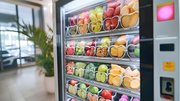Article
Convenience services operators, suppliers sharpen safety focus
Convenience services operators and suppliers are fine tuning their safety and sanitation practices to protect the health of their customers and employees in response to the COVID-19.
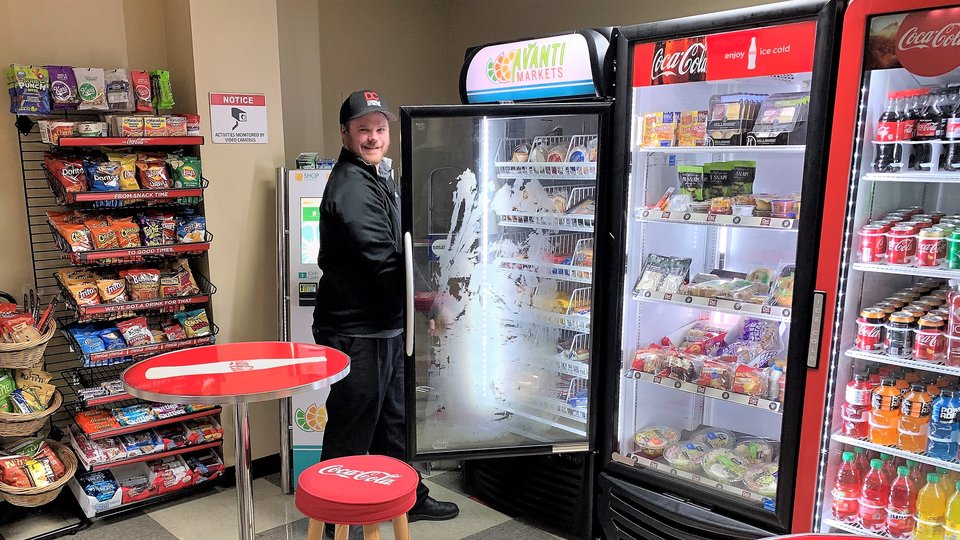
March 23, 2020 by Elliot Maras — Editor, Kiosk Marketplace & Vending Times
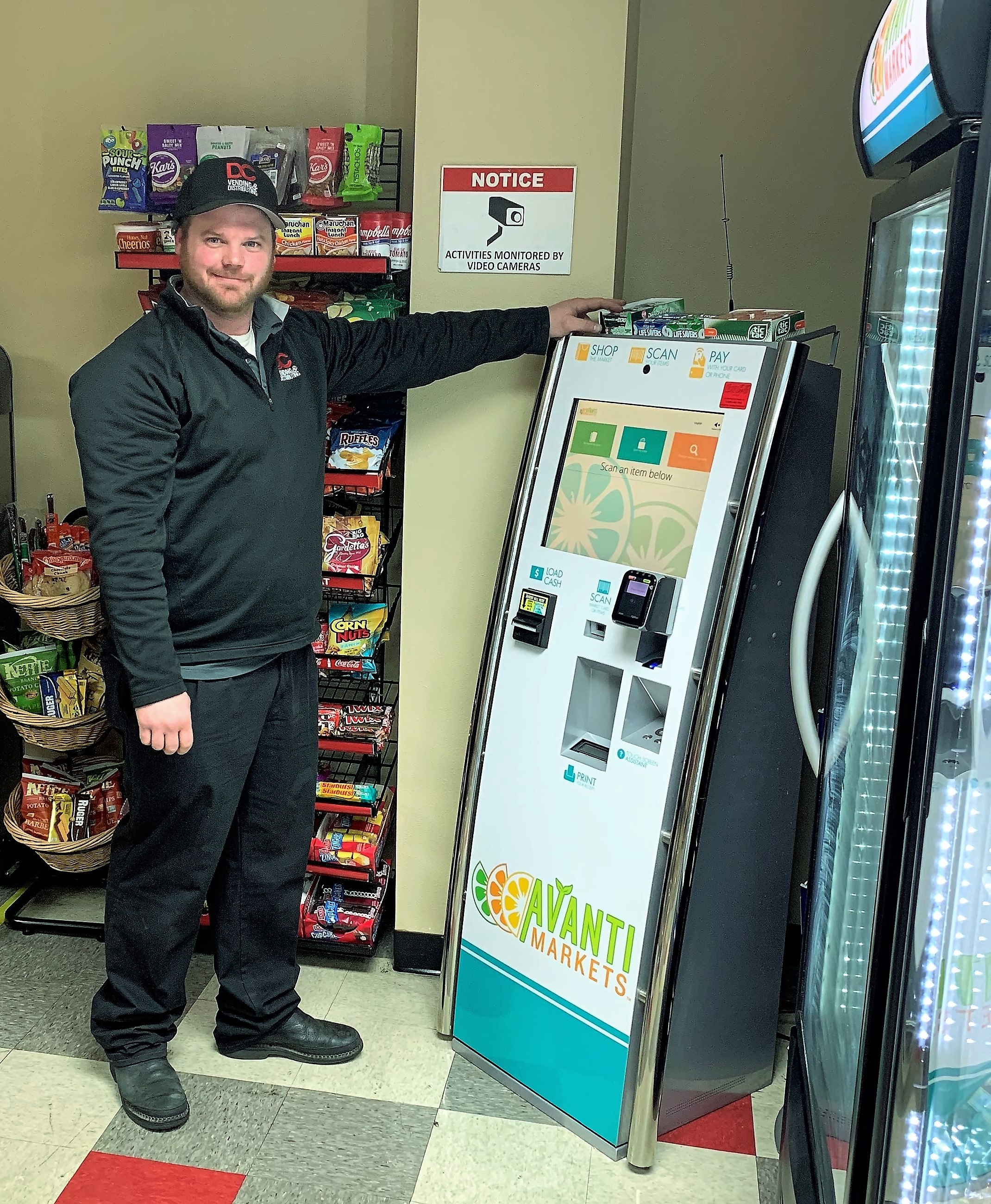 |
| Cody Smeback focuses on cleaning thard surfaces at a customer account. Photo courtesy of DC Vending & Distributing LLC. |
As COVID-19 continues to wreak havoc across the nation, convenience services operators and suppliers are fine-tuning their safety and sanitation practices to protect the health of their customers and employees.
While many accounts are closed by government order and/or general safety concerns, those that remain open for business have fewer foodservice options due to restaurant closures, making convenience services the only alternative.
In this unusual and somewhat chaotic operating environment, operators have gone out of their way to advise customers about the safety precautions they are taking. Vending Times caught up with several this past week.
"There are a lot of our accounts that we can't get into at all, and there are several of them that are sending us emails or phone calls asking that we 'up' our service because their employees can't leave for lunch to run out to a local convenience store or grocery store or restaurant," said Jeff Hemp, on-premise manager at DC Vending & Distributing LLC, a division of The Coca-Cola Co. Yakima & Tri Cities based in Yakima, Washington. Overall, he said, company sales are down about 20%.
Some accounts require service personnel to have their temperature taken before entering the facility, Hemp said, while others require his employees to sign statements that they haven't been out of the country recently.
Given these concerns, Hemp said the company has sent a summary to its customers of how the company is managing potential risks associated with COVID-19. Like several other operators interviewed, DC Vending & Distributing based its precautionary measures on recommendations from the Centers for Disease Control and Prevention.
Emphasis on sanitizing hard surfaces
The company is emphasizing disinfecting and sanitizing hard surfaces, Hemp said. To encourage associates to support these efforts, the company has also made alcohol- based hand sanitizers more accessible.
Associates that have traveled out of the country or have returned from a cruise are instructed to work from home for 14 days. The company has also reduced the number of outside visitors and meetings in its facilities and is encouraging teleconferencing. Participation in trade events has been canceled.
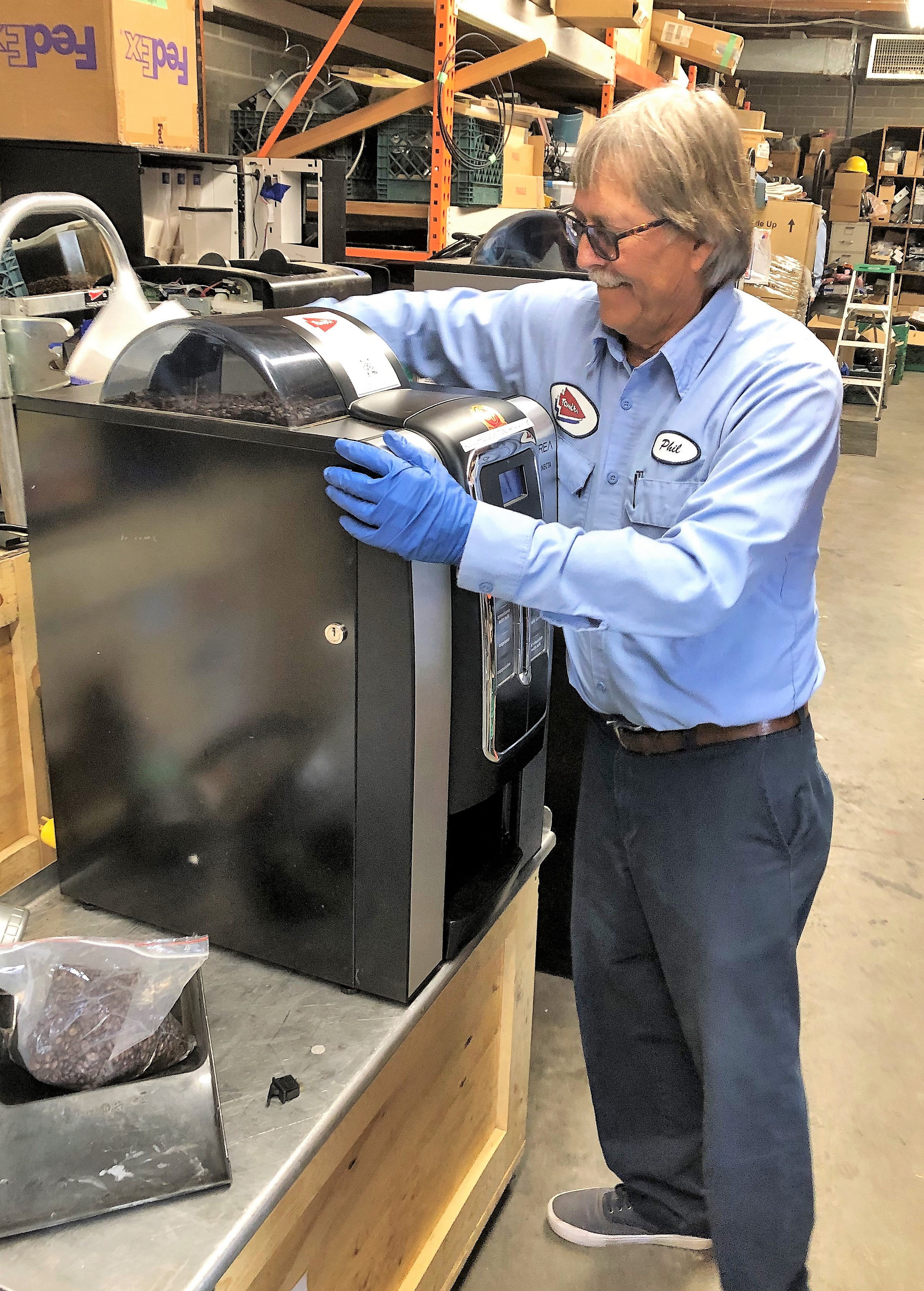 |
| Phil Seekatz of Tomdra Inc. wears gloves handling a coffee machine. Photo courtesy of Tomdra. |
Tomdra Inc., a provider of micro markets, pantry service and vending service, based in Tucson, Arizona, also developed an official response for customers and employees to show what the company is doing to help stop the spread of the virus, said Todd Elliott, vice president.
"We are also letting our customers know we are fully staffed and functional to help out in any way we can to meet their specific guidelines requirements and service needs," Elliott said.
- All Tomdra employees are told to avoid touching eyes, nose or mouth with unwashed hands. They are also told to wash hands thoroughly and frequently, and to avoid shaking peoples' hands.
- Route and service personnel are required to wash their hands upon entering a client building and to wear gloves when servicing machines and micro markets.
- Warehouse personnel are required to wear gloves when pulling vending and micro market loads.
- All kiosk and vending screens and other contact points will be sanitized with each service visit, using hydrogen peroxide.
- Employees displaying flu-like symptoms will be isolated from others and sent home immediately.
Five Star Food Service, a convenience services operation based in Chattanooga, Tennessee, has been monitoring daily the information from local, state and federal authorities to ensure the most accurate and up-to-date data to guide the company, Alan Recher, the company's president and CEO, said in a prepared statement. The company has taken the following steps to increase safety and peace of mind for customers and service teams.
- Enhanced and more frequent cleaning of high-touch areas, such as foodservice dining, vending machines, snack dispensers, coffee brewers, cooler door handles and micro market kiosks.
- Enhanced methods beyond the standard HACCP-required cleaning and food production processes.
- Suspended non-essential, business-related travel by company employees.
- Suspended non-essential visitors to Five Star facilities.
- Suspended non-essential, in-person meetings at Five Star facilities.
- Reinforced employee sick and absentee policies to include remote work and sick leave.
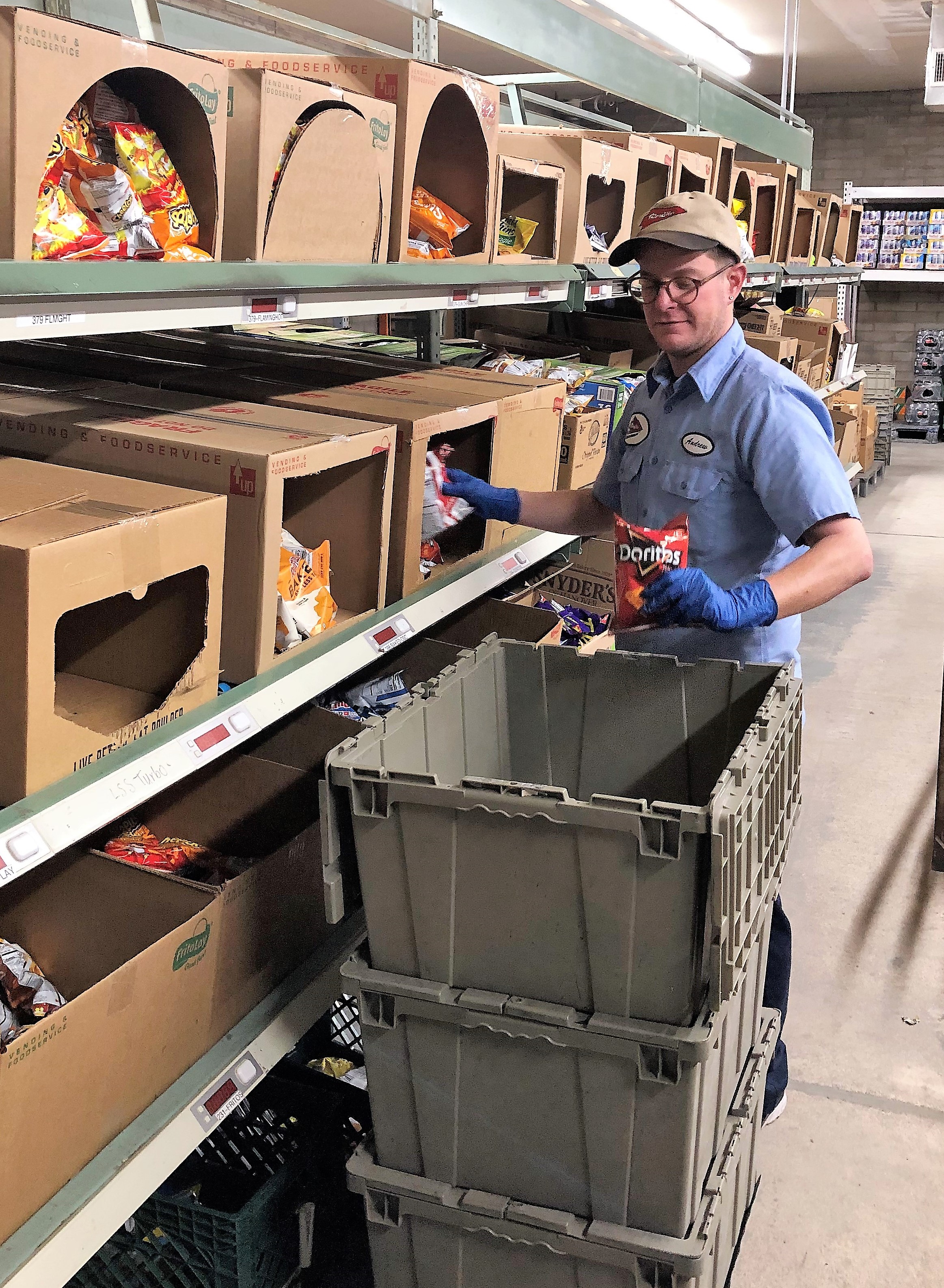 |
| Andrew Goodman-Dufresne wears gloves pulling products in the warehouse for delivery. Photo courtesy of Tomdra. |
"We are also working closely with our largest suppliers to minimize supply chain concerns and ensure they are taking the same or greater precautionary measures to lessen the impact of this virus," Recher said in an email.
A forward-looking approach
"As this unique period unfolds, we believe we must continue to move forward and that our business and others cannot and will not stop because of this virus," Recher said. "With that, we will proceed with educated caution every day and remain flexible to adjust and accommodate service schedules as feasible for each of our customers' needs in this rapidly evolving environment."
Ice Cream Factory Vending, a four-route operation in St. George, Utah, has adjusted the micro market delivery schedule so that the servicer is out of the break-room during employee break time to reduce his exposure to people who could be infected, said Ken Webb, company owner.
"At the Family Dollar distribution center, they've got like 500 employees in there," Webb said. "He's packed up and ready to go before they get into the break-room."
On March 13, Aramark CEO John Zillmer posted a statement on the company website to announce the company was intensifying preventative measures such as enhanced sanitation and hygiene practices.
Zillmer also said the company is working closely with partners to assess and modify customer-facing services to provide a safe and comfortable environment.
Suppliers also take initiative
Both product and equipment suppliers have taken similar safety improvement measures.
Reunion Coffee Roasters, based on Oakville, Ontario, emailed a notice to customers from its president, Adam Pesce, to advise them of the company's actions to protect customers, employees, vendors and their families. These include:
- Increased internal and external guest screening processes.
- Increased frequency of international communication and resource-sharing to ensure employees have the most comprehensive information about COVID-19 and are aware of their access to medical testing and care specific to this pandemic.
- Added hygiene and wellness stations throughout the roastery, with instructions and resources to raise awareness about hygiene and personal care best practices.
- Encouraged employees who are ill or symptomatic to stay home or go home while maintaining their job security.
- Increased safety stock of core coffee items to support order fulfillment.
The company said it is taking guidance from Health Canada, the Ontario Ministry of Health, the World Health Organization and medical experts to inform future decisions.
The company has also made available a list of best practices and resources to customers.
iFillSystems, a manufacturer of K-Cup filling machines, brewers and related equipment, sent out a letter from CEO Edward Cai citing the following measures being taken at its Washougal, Washington facility:
- Reinforced hygiene guidelines by health experts, such as CDC, urging people to keep the 6-foot social distance in meetings and in offices.
- Added hand sanitizers in every office and conference room.
- Implemented additional cross-training to minimize business disruption.
- Temporally changed on-site equipment training to video conference training.
The company has also required production teams to wear safety masks until the COVID-19 risk is under control in all of its factories.
At the present time, no one knows when companies will feel enhanced safety measures can be lifted. In the meantime, convenience services providers are going the extra mile to ensure customer and employee safety.
For up-to-date coverage on how the coronavirus impacts convenience services,click here.
About Elliot Maras
Elliot Maras is the editor of Kiosk Marketplace and Vending Times. He brings three decades covering unattended retail and commercial foodservice.
 ChatGPT
ChatGPT Grok
Grok Perplexity
Perplexity Claude
Claude